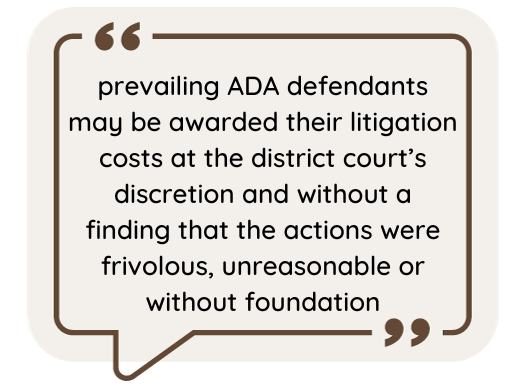The prevailing wisdom in Americans with Disabilities Act litigation is that defendants who successfully prevail in ADA and Unruh Civil Rights Act lawsuits cannot recover their attorneys’ fees or defense costs. This prevailing wisdom compels most businesses to settle, rather than pursue a meritless case to summary judgment or trial. The tide may just be changing as more courts are awarding successful defendants their attorney’s fees and defense costs.

As we recently posted, a JMBM client was awarded over $100,000 in attorneys’ fees and costs in two separate cases. The first award of fees and costs was against high frequency litigant Orlando Garcia, and the second award was against the law firm representing him, the Center for Disability Access. Garcia and the Center for Disability Access appealed the awards; however, our clients will nevertheless seek to enforce the judgments pending the appeals. Continue ›
 ADA Compliance and Defense Blog
ADA Compliance and Defense Blog



 Recently, JMBM
Recently, JMBM 
 Special districts are independent, governmental agencies or entities established to deliver specialized services to the community, including health, safety, and well-being. Think fire departments, sewer/water districts, and parks departments.
Special districts are independent, governmental agencies or entities established to deliver specialized services to the community, including health, safety, and well-being. Think fire departments, sewer/water districts, and parks departments.